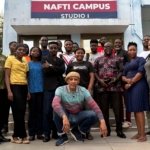
Film enthusiasts, students and faculty at the University of Media, Arts and Communication – Institute of Film and Television (UniMAC-IFT) were treated to an exclusive screening of Comrade Tambo’s London Recruits on 1 September 2025, followed by a Q&A session with its producer, Collin Charles.
The gripping documentary explores Ghana’s role in supporting South Africa’s liberation struggle and the wider anti-apartheid movement. The post-screening discussion delved into the historical significance of the story and the filmmaking techniques that brought it to life.
Charles reminded the audience of Ghana’s pivotal support during apartheid, which included financial, diplomatic and logistical assistance to freedom fighters. He stressed the importance of recognising African leaders like Oliver Tambo, who coordinated the global anti-apartheid movement while Nelson Mandela was imprisoned.
“The evil system of apartheid in the southern African country… made the people who lived there into second-class citizens with no vote and no rights to property,” he said.
Audience members and faculty shared their impressions. Mr George Bosompim praised the film’s sound design, saying: “The soundtrack throughout it… is so solid that it just carries you along. It felt as if it was a short film but it’s over an hour.”
Daniel Adjocatcher commended the blend of dramatisation and archival footage but suggested that later sequences could have been stronger. Another student, Makida, noted how explosions, ambient sound and set design gave the film realism and immediacy.
Charles explained that pre-production lasted six weeks, covering set design, costumes and props. Though dramatisations were filmed in the UK and South Africa, the sets were carefully built to resemble authentic South African locations. Archival footage was sourced through crowdsourcing. “We put adverts on Facebook… and they sent them to us,” he revealed.
One of the techniques employed was “finding the action” cinematography, using handheld, sometimes unstable camera movements to capture the urgency of real documentary footage. “That instability that you feel adds to the danger… it looks like it was shot by somebody making a documentary of a live thing that’s going on,” Charles explained.
Sound, which he described as “60% of the storytelling,” was layered with effects, ambient noises and carefully composed music to heighten tension and reflect cultural history. “The person who composed the music worked on frequencies that increased tension,” he added.
Production design extended to hospital and prison sets, as well as vintage props like radios and telephones. Casting prioritised actors who could embody historical figures convincingly, even lip-syncing archival interviews. “The guy who did Chris Hani… was uncanny. He really understood that person’s history and their opinions,” Charles recalled.
Editing proved one of the toughest stages. The initial cut ran over two and a half hours, forcing Charles and his team to make painful reductions. “Each time we cut out a character, then we had to cut out his story… it was like killing your children,” he admitted.
The Q&A concluded with reflections on production design, cinematography and historical accuracy. One student summed up the experience: “I will recommend this film to anybody… it takes your time and you get to know the real history behind some of these things.”
Comrade Tambo’s London Recruits will be screened to the general public on Sunday, 7 September, at Silverbird Accra.